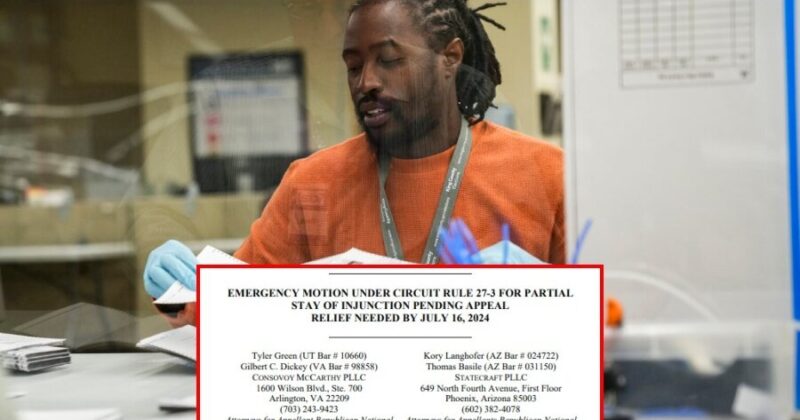On July 1, the Republican National Committee (RNC) and members of Arizona’s state Legislature filed a motion to halt a federal court order. This order aims to prevent certain voters, who registered using a federal voter registration form, from participating in the November elections.
RNC Chairman Michael Whatley stated that the emergency motion was filed because the RNC believes that “noncitizen voting undermines our elections” and is “dedicated to stopping it.”
The controversy centers on Arizona’s 2022 election law, HB 2492, which requires proof of citizenship to vote in state elections. Another 2022 law, HB 2243, which mandates reporting the number of voters who did not disclose their citizenship status, is also facing legal challenges.
Voting rights groups filed lawsuits against both measures, and U.S. District Judge Susan Bolton found that parts of the legislation circumvented federal voting laws, although other portions of the two laws were upheld.
Campaign Legal, one of the groups that filed the lawsuit, described the two provisions as “discriminatory.” They argued that one provision “denied the right to vote to Arizonans who did not list their birthplace on the state registration form,” while the other requires “county officials to investigate the citizenship status of naturalized Arizonans without sufficient cause.”
Earlier this year, Judge Bolton concluded that Arizona legislators did not discriminate when they adopted the two laws and that the state does have an interest in preventing voter fraud and limiting voting to individuals who are eligible to vote.
However, the judge ruled that HB 2492’s requirement for individuals using a state registration form to include their state or country of birth violates the Civil Rights Act and the National Voter Registration Act. She explained that this requirement would lead to investigations of naturalized citizens based solely on county recorders’ subjective beliefs that they are noncitizens.
On June 28, she again ruled that those portions of the laws should be struck down, prompting the emergency motion on July 1.
The RNC filed its motion with the San Francisco-based U.S. Ninth Circuit Court of Appeals, which is currently hearing the case, in a bid to overrule Judge Bolton’s most recent decision, seeking to keep the state registration form provision intact.
It argued in part that portions of the law that Judge Bolton had blocked should be kept in place during the ongoing appeal process because it would affect the upcoming presidential election.
“The district court did not engage with the Constitution’s text because it thought that it was bound by precedent,” the RNC’s motion reads.
“But no court has decided this issue. The Supreme Court has never held that Congress possesses power to regulate the ‘Places and Manner’ of presidential elections.”
And, it added, “if the district court erred in interdicting the implementation of voter registration reforms adopted nearly two years ago (and it did),” a statute known as the Purcell principle, which established that courts shouldn’t change voting or election rules so close to an election that voters will be confused, “neither requires nor licenses this Court to compound the federal judiciary’s mistaken incursion into Arizona’s democratic process.”
Mr. Whatley said U.S. elections “should be decided by Americans.”
Arizona’s GOP chair, Gina Swoboda, added that “any vote cast by a non-citizen dilutes those votes and risks silencing those voices.”
“This is a very real problem in Arizona, and we are committed to resolving it,” she said.
Democratic Secretary of State Adrian Fontes had asked the court to deny the RNC’s request and allow portions of that law to remain blocked by Judge Bolton because it’s too close to the election.
“Election officials across Arizona are preparing for what is expected to be a very active 2024 election cycle,” Mr. Fontes’s office wrote to the court.
In her March decision, Judge Bolton ruled that certain provisions of the laws can remain in place, including those requiring counties to verify the registration status of voters who haven’t provided proof of U.S. citizenship. She also upheld the requirement to cross-check voter registration information with government databases.
At the time, Judge Bolton wrote that “considering the evidence as a whole, the court concludes that Arizona’s interests in preventing non-citizens from voting and promoting public confidence in Arizona’s elections outweighs the limited burden voters might encounter when required to provide” documentary proof of citizenship.
Data from the Arizona attorney general’s office reveals that no noncitizen has been prosecuted for illegal voting in elections since 2010.
Share your thoughts by scrolling down to leave a comment.


Of course illegals voting undermines the elections in America! Duh.
That’s the purpose! That’s the reason!
We’re giving away too much to the Commie infiltrators!